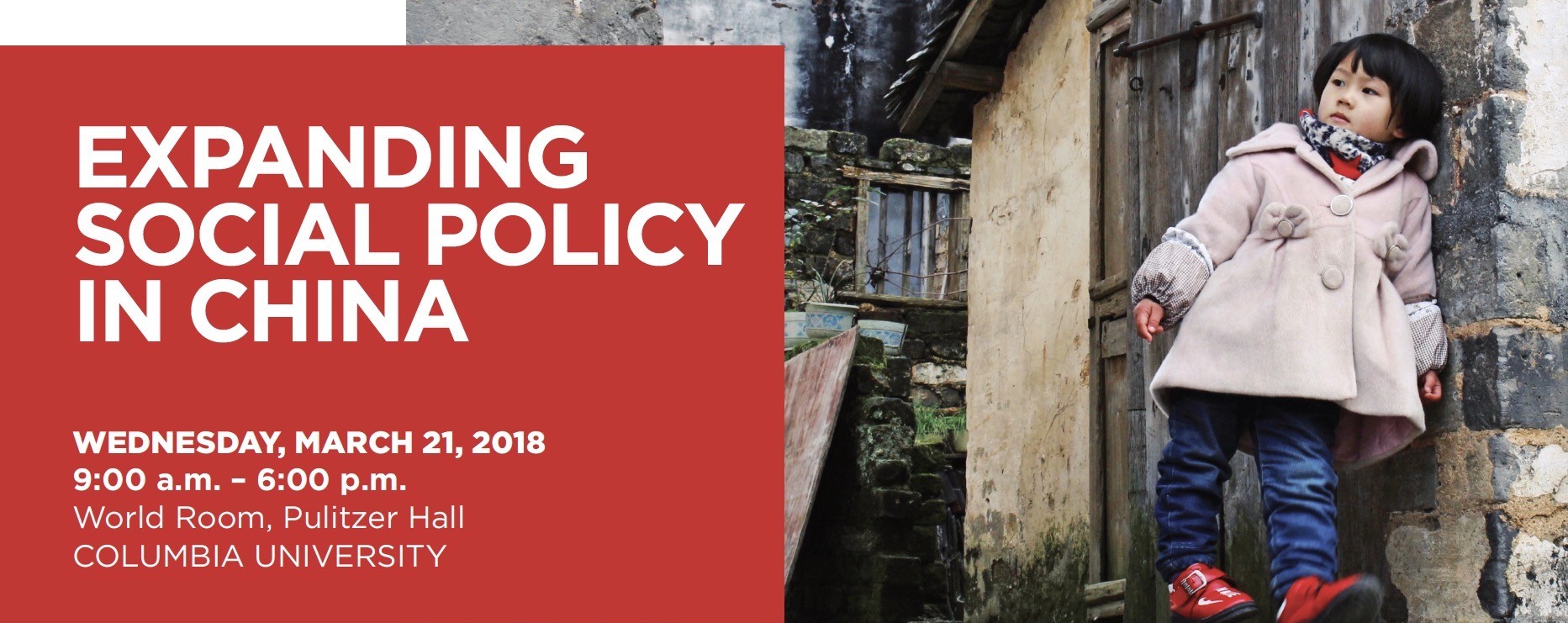The all-day conference on “Expanding Social Policy in China” hosted by the Columbia China Center for Social Policy on March 21st, 2018 comprised of three sessions that examined recent developments and future directions of Chinese social policy.

The opening session, chaired by Dr. Jane Duckett (University of Glasgow, UK), focused on the recent trends and developments in Chinese social policy. Dr. Wang Feng (University of California, Irvine) presented findings on the beneficiaries of the expanding public transfers in China, revealing that the rich received more in absolute terms while the poor benefited more in relative terms. Dr. Xian Huang (Rutgers University) discussed different driving forces for social policy reforms in China’s multilevel governance setting. She pointed out that local adoption of social policies was mainly driven by the top-down pressure for compliance when the policy was political, whereas it was mainly driven by bottom-up motivations when the policy was less political. Dr. Qin Gao (Columbia University) offered an in-depth evaluation of the achievements and challenges in China’s ongoing efforts to eradicate poverty by 2020. Dr. Mark Frazier (New School University) served as the session discussant. He urged the presenters and audience to consider the influence of China’s political system on social policy development.
The second session centered on new evidence on poverty, inequality, and public policies in China, chaired by Dr. George Hong (Fordham University). Dr. Juan Yang (Beijing Normal University, China) examined how education expansions in China contributed to the widening of urban workers’ wage gaps through decomposition analysis of the China Household Income Project (CHIP) 2002 and 2013 data. Dr. Quheng Deng (Chinese Academy of Social Sciences) revealed that educational assortative mating led to increasing earnings inequality in urban China. Dr. Sui Yang (Chinese Academy of Social Sciences) found that the poverty reduction effects of social assistance in rural China varied by region, with better outcomes in eastern and western areas than those in central China. Dr. Yanxia Zhang (China Agricultural University) discussed the care crisis and mental health needs of rural elders in China, as a consequence of insufficient pensions and health care as well as eroding filial piety and weakening family support. The discussant, Dr. Chris Wimer (Columbia University), offered a cross-national perspective by comparing poverty and inequality patterns between China and the US and affirmed the importance of reducing inequality through expanding social policies.
The third session, chaired by Dr. Sarah Jessup (Children of China Pediatrics Foundation), focused on child development and well-being. Dr. Emily Hannum (University of Pennsylvania) demonstrated how school consolidation in rural China had negative impacts on children’s educational attainment, especially for girls. Drawing from a new national survey of migrant children, Dr. Lu Yao (Columbia University) revealed that rural left-behind children faced multiple disadvantages due to emotional distress, lack of attentive parenting, and limited education opportunities as compared to their urban peers as well as rural children living with their parents. Dr. Karen Fisher presented changes in China’s child welfare institutions in response to mixed welfare expectations, highlighting family-based foster care as the model approach. Ms. Jillian Popkins (UNICEF China) discussed essential basic services for early childhood development in China through the lens of the United Nation’s Sustainable Development Goals. She called for attention to the integrated support of health, nutrition, responsive caregiving, early learning, and security. Dr. Bruce Bradbury (University of New South Wales, Sydney), as the discussant, urged the presenters to consider theories behind the observed effects and be cautious about stating causal relationships.
The concluding session of the all-day conference, chaired by Dr. Qin Gao, was a lively and stimulating roundtable discussion on the future directions of Chinese social policy. Dr. Chuliang Luo (Beijing Normal University) addressed income and wealth inequality and maintained that redistribution programs were needed to protect the lower-income groups. Dr. Dorothy Solinger (University of California, Irvine) pointed out the lack of attention to urban poverty in China by both scholars and policymakers. Dr. Jinyu Liu (Columbia University) urged the expansions in elder care services such as long-term care and innovative caregiving programs. Dr. Bin Xu (Emory University) commented on the need for a more active and robust civil society in China’s social policy agenda. Dr. Tobias ten Brink (Jacobs University Bremen, Germany) reflected on the dynamics of social policy in global and historical perspectives and called for cross-national collaborations. Dr. Carl Riskin (Columbia University), as the discussant, suggested the importance of recognizing the increasing demand for welfare as a result of China’s continued economic growth and Chinese citizens’ aspiration for a better life and a fairer society.
Click here for the news report about this conference.
The conference concluded in a shared aspiration by all participants for continuing these conversations in the future. Dr. Qin Gao, Director of the China Center for Social Policy, expressed interests to provide future opportunities for continued dialogue and engagement by international, interdisciplinary scholars, policymakers, and practitioners. Co-sponsors of the conference included the Weatherhead East Asian Institute at Columbia University, Columbia School of Social Work, Columbia Global Centers | Beijing, Confucius Institute, and the China Institute for Income Distribution of Beijing Normal University.
Click here for the full conference program.